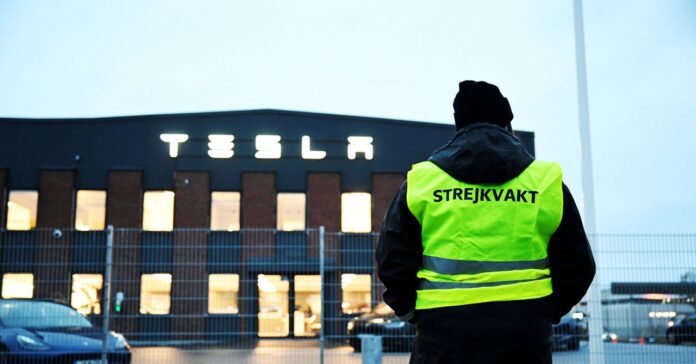Tesla is suing Sweden as the carmaker hits back at an attempt by local unions to disrupt its business in an ongoing battle over workers’ rights.
In the lawsuit, filed Monday, Tesla says it is suing “the Swedish state through the Swedish Transport Agency” because local union members were refusing to deliver new license plates to the company, effectively blocking Tesla from selling new cars in the country. In a quick decision, the Norrköping district court said the company should be allowed to circumvent existing rules and collect its license plates itself. The Swedish Transport Agency has 14 days to respond to the decision.
Swedish unions describe their fight against Tesla as existential for the Swedish labor market. Sweden doesn’t have laws that dictate workers’ rights, such as minimum wage. Instead, around 90 percent of Swedish workers are covered by collective agreements, a type of contract that regulates the relationship between employers and their employees, including pay, pensions, and working hours. Tesla’s refusal to sign a collective agreement with its mechanics has enraged union bosses, who are worried the company could set a precedent.
“It’s the whole system that is at stake,” says Tommy Wreeth, chairman of the Swedish Transport Workers’ Union, whose members are refusing to unload Tesla cargo at Swedish ports. “That’s why all Swedish unions see this as a crucial fight.”
License plates stopped being delivered to Tesla when Seko, the Swedish union representing postal workers, joined a countrywide blockade against the company on November 20. Seko said its members would not deliver post, parcels, or pallets to Tesla until it signed a collective agreement with Swedish car mechanics, who have been on strike since October 27. Tesla filed a separate lawsuit against the Nordic postal service PostNord in an attempt to get the company to release its packages.
The lawsuits are part of a growing crisis in Sweden, with more unions joining action against Tesla. The revolt started with the union representing the mechanics, IF Metall, but other Swedish unions have since introduced “sympathy measures” in an attempt to force the company to sign. Swedish cleaners are refusing to clean Tesla showrooms, electricians won’t fix the company’s charging points, and dockworkers are refusing to unload Tesla cargo at Swedish ports.
“We note that Tesla has chosen to take the long route, starting legal proceedings,” says Veli-Pekka Säikkälä, national bargaining secretary at IF Metall. “There is a simple and quick way to solve this situation, and that is to sign a collective agreement. As soon as Tesla does that, the conflict ends.”
Tesla CEO Elon Musk commented publicly on the Swedish blockade for the first time last week, calling the situation “insane” in a comment on X. But the lawsuit is the first sign that Tesla’s business in Sweden—its fifth largest European market—has been affected by the blockade.
“[It tells us] they are desperate,” claims Jonas Pettersson, a spokesperson for Seko, adding he hopes the company will sign a collective agreement with IF Metall in due course. Tesla did not immediately respond to WIRED’s request for comment.
Sweden’s transport agency has not yet seen the lawsuit, according to spokesperson Mikael Andersson, but he confirmed it had been submitted. “Tesla believes that the Swedish Transport Agency does not meet the requirement to provide registration plates to newly registered vehicles in Sweden,” he says. “We at the Swedish Transport Agency do not share this view.” The agency is neutral in the conflict, Andersson adds.
The lawsuit was filed three days after workers at a Swedish factory that makes Tesla parts and sends them to the company’s gigafactory in Berlin joined the blockade. On Friday, around 50 unionized workers employed by a Swedish subsidiary of the Norwegian company Hydro stopped working on Tesla products at the company’s plant in Vetlanda, in southern Sweden.
“As of November 24, the production of certain products at the plant is affected by what is a legal union action in Sweden,” says Hydro spokesperson Halvor Molland. He declined to comment on whether the blockade had impacted shipments to Tesla’s factory in Berlin.
Source : Wired







